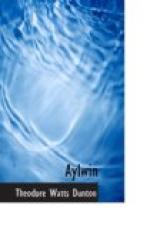’The materialist, with his primitive and confiding belief in the testimony of the senses, is beginning to be left out in the cold, when men like Sir W. R. Grove turn round on him and tell him that “the principle of all certitude” is not and cannot be the testimony of his own senses; that these senses, indeed, are no absolute tests of phenomena at all; that probably man is surrounded by beings he can neither see, feel, hear, nor smell; and that, notwithstanding the excellence of his own eyes, ears, and nose, the universe the materialist is mapping out so deftly is, and must be, monophysical, lightless, colourless, soundless—a phantasmagoric show—a deceptive series of undulations, which become colour, or sound, or what not, according to the organism upon which they fall.’
These words were followed by a sequence of mystical sonnets about “the Omnipotence of Love,” which showed, beyond doubt, that if my father was not a scientific thinker, he was, at least, a very original poet. And this made me perplexed as to what could have drawn Wilderspin, who scorned the art of poetry, into the meshes of The Veiled Queen. Perhaps, however, it was because Wilderspin’s ancestry was, notwithstanding his English name, largely, if not wholly, Welsh, as I learnt from Cyril. Welshmen, whether sensitive or not to the rhythmic expression of the English language, are almost all, I believe, of the poetic temperament.
But from this moment my mind began to run upon the picture of Fenella Stanley, surrounded by those Snowdonian spirits which her music was supposed to have evoked from the mountain air of the morning.
XIII
THE MAGIC OF SNOWDON
I
In a few days I left London and went to North Wales.
Opposite to me in the railway carriage sat an elderly lady, into whose face I occasionally felt myself to be staring in an unconscious way. But I was merely communing with myself: I was saying to myself, ’My love of North Wales, and especially of Snowdon, is certainly very strong; but it is easily accounted for—it is a matter of temperament. Even had Wales not been associated with Winnie, I still must have dearly loved it. Much has been said about the effect of scenery upon the minds and temperaments of those who are native to it. But temperament is a matter of ancestral conditions: the place of one’s birth is an accident. As some, like my cousin Percy, for instance are born with a passion for the sea, and some with a passion for forests, some with a passion for mountains, and some with a passion for rolling plains. The landscape amid which I was born had, no doubt, a charm for me, and could bring to me that nature-ecstacy which I inherited from Fenella Stanley. But with Wales I actually fell in love the moment I set foot in the country. This is why I am hurrying there now.’




